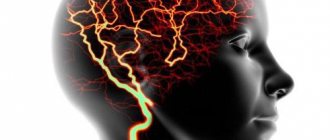: Reading time:
Psychotherapist and clinical psychologist Yulia Khvorova answers common questions about bipolar affective disorder (BAD).
In this article, I tried to answer the questions that clients with newly diagnosed bipolar disorder ask me. I will try to answer simply and clearly, based on scientific facts and information that I received during practical work with BAR.
What symptoms are used to diagnose bipolar disorder? How does the disease manifest itself?
Bipolar disorder is characterized by severe mood swings. The mood for several months, weeks or (less often) for several hours “goes to extremes” - it becomes too cheerful and too bad.
The mood for several months, weeks or (less often) for several hours “goes to extremes” - it becomes too cheerful and too bad.
Mania or hypomania is an elevated mood and violent physical and mental activity. Mental activity becomes heterogeneous - attention captures every detail, but it is difficult to concentrate on one thing for a long time. Thoughts are constantly “jumping”, one idea is quickly replaced by another. All emotions intensify: joy - to euphoria, irritation and resentment - to aggression, suspicion - to paranoia. Physical activity also increases: you almost don’t want to sleep (three hours of sleep seems enough), sexual desire increases. Behavior becomes impulsive, reckless, sometimes even adventurous and eccentric. A person can become obsessed with an idea. During a manic episode, delusions and hallucinations may occur.
Hypomania is liked by everyone who has experienced it at least once. With hypomania, unlike mania, delusions or hallucinations occur less frequently, criticality remains, and aggression is lower. However, hypomania is not a normal mental state; the brain works in an enhanced mode. Reserve resources are used to speed up mental processes, and when they run out, complete exhaustion occurs. With hypomania, the psyche seems to be running a sprint. Imagine if you only run all your life - your body will quickly deplete and wear out. It’s the same with the psyche. Hypomania can develop into more unpleasant states - mania or depression.
Reserve resources are used to speed up mental processes, and when they run out, complete exhaustion occurs. With hypomania, the psyche seems to be running a sprint.
Another sign of bipolar disorder will be not just a bad mood, but depression, from mild short-term to severe long-term. Here everything is the other way around. Activity drops: when you need to do something, there is neither strength nor desire. Mental activity is even more difficult: in addition to the lack of desire and strength, it is difficult to concentrate, remember, analyze, and make a decision. The experience of emotions becomes dull, with the exception of worsening resentment, guilt, hopelessness, confusion, anxiety or indifference. Appetite changes, insomnia or excessive sleepiness appears. Even if you are a very cheerful person, severe depression can cause suicidal thoughts. With severe depression, delusions and hallucinations may occur.
These phases can replace each other and can appear simultaneously. For a long time, only one pole can manifest itself - then even doctors, instead of correctly diagnosing “BAD,” may first diagnose “depression.” The breaks between episodes (intermissions) are different for everyone - it can be a month, a year, three years, five years.
In a healthy person, changes in the activity of mental processes are not so contrasting and are more amenable to regulation. They do not lead to a deterioration in everyday functioning - a person can successfully cope with the professional and academic responsibilities assigned to him, and establish and maintain relationships with others.
Bipolar Personality Disorder: Symptoms and Signs
To recognize bipolar disorder early, you need to try to look for symptoms and signs of mania or depression. If you are experiencing these conditions, then perhaps it is time to consult a specialist.
Signs of mania
- You may feel happy and uplifted for a very long time. From several hours to several days;
- you sleep very little, but feel alert;
- you speak very quickly. Those around you don’t even always have time to understand you, and it’s as if you yourself can’t keep up with the train of your own thoughts. It’s as if it becomes easier for you to communicate online using text than in real life using speech;
- you are very impulsive. It’s easier for you to do it first and think later;
- you find it difficult to focus on one task. You are constantly jumping from one thing to another. The final result suffers from this;
- you are very confident in yourself. It seems to you that you are much smarter and faster than most people;
- often you take risks. For example, you make thoughtless purchases, put yourself in danger, or agree to have an intimate relationship with a stranger.
Signs of Depression
- you can live through periods of sadness and hopelessness for a very long time, although there are no objective reasons for this, nothing happened;
- you become very withdrawn. It’s hard for you to even leave the apartment. You stop communicating with friends and family;
- interest in activities and things that have always fascinated you disappears. But new hobbies do not appear;
- appetite has changed dramatically. You no longer control how much you eat;
- I always lack the strength to do even the simplest things. This continues for a long time, for example several weeks;
- It’s hard for you to remember information, concentrate and make any decisions;
- sometimes you have thoughts of suicide, life seems meaningless and gray.
Bipolar disorder is when you recognize yourself in almost all of the above conditions. At one stage of your life you show signs of depression, at another - mania. Sometimes it happens that the symptoms seem to be mixed up, and you do not understand which phase you are in.
Diagnosing bipolar disorder is very difficult, primarily because it is difficult to correctly identify periods of mania. This is why depression is often misdiagnosed instead of bipolar disorder.
What are the causes of bipolar mental disorder?
Unfortunately, science cannot answer why bipolar disorder occurs. What is known is that many factors interact with each other.
Now the occurrence and development of the disease is considered through the biopsychosocial model (BPSM). According to this model, the development of the disease is influenced by three factors - biological, psychological and social.
The biological factor includes genetics, physiological and biochemical characteristics of the body.
Psychological factors in the development of bipolar disorder include the number and intensity of stressful experiences, coping strategies, character traits, emotional sphere, and thinking.
Social factors - cultural and political situation, economic situation, microsocial environment (family, friends, professional environment, acquaintances).
The emergence and development of bipolar disorder is not caused by one of these factors, but is a consequence of their interaction.
Unfortunately, science cannot answer why bipolar disorder occurs. What is known is that many factors interact with each other.
Questions like “Why me?”, “What causes BAD?”, which cannot be answered, are called rumination. The thought chains that arise when thinking about such questions do not lead to an answer, but lead to a decrease in mood, increased anxiety and a feeling of hopelessness. Psychotherapeutic techniques and communication with loved ones will help you switch or abstract from such thoughts.
Is it possible to cure bipolar disorder in Israel?
Experienced doctors speak very carefully about a complete cure for bipolar disorder, since due to the characteristics of metabolism (namely, neurotransmitters), the risk of relapse of the disease always remains. However, correctly selected therapy allows one to achieve stable remission, which means for the patient the elimination of painful symptoms and a return to normal life, especially since the intellectual function in this disease does not suffer and the personality is not destroyed.
In Israel, patients with bipolar disorder live a normal life, they are socialized, work and differ from other people only in the need to constantly take medications and periodically visit a doctor. However, many other people have the same need, for example, those suffering from diabetes.
It should be said that Israeli doctors have achieved significant success in the treatment of mental disorders. Here an individual approach to the patient is practiced and the most progressive methods of therapy are adopted. Psychosocial rehabilitation is widely used, the patient’s family is involved in the treatment process, and training is provided to help the patient’s relatives better understand him, and for him to better understand his loved ones. The latest generation of drugs are used and the latest protocols are applied, which ensures fewer side effects and greater efficiency.
Advanced treatment for bipolar disorder in Israel can be obtained by contacting the Renaissance Clinic. In addition to mental illness, she specializes in the treatment of addiction, which is very useful, since patients with bipolar disorder often suffer from it in one form or another.
How is bipolar personality disorder treated? Will I be in a mental hospital?
The need for hospitalization may not arise if you take a responsible approach to treatment. If left untreated, episodes of mania and severe depression are likely to result in hospitalization. However, hospitalization does not put an end to a person’s life, but helps to get out of an episode of depression or mania and return to normal life.
As mentioned earlier, the course of bipolar disorder is influenced by three factors - biological, psychological and social. To minimize the impact of bipolar disorder on your life, you need to take control of all three factors. In this case, you will not have to go to the hospital and outpatient treatment will be sufficient.
The biological factor will be taken over by medications and a healthy lifestyle. A psychiatrist will prescribe the necessary medications for you. The medications must be taken regularly; you should not pause without consulting your doctor. If you experience unpleasant side effects, discuss this with your doctor and decide together whether to wait, change the dosage, or switch to another drug.
A healthy lifestyle helps maintain the normal state of all body systems, including the nervous system. Taking medications will not have a good effect if drugs or alcohol are simultaneously affecting the brain. The following will help you maintain your nervous system, and therefore all mental activity, in good condition: stable good sleep (at least seven hours), absence of bad habits (alcohol, drugs, smoking), regular physical activity, proper rest, adherence to a daily routine, proper nutrition.
The medications must be taken regularly; you should not pause without consulting your doctor. If you experience unpleasant side effects, discuss this with your doctor and decide together whether to wait, change the dosage, or switch to another drug.
Psychotherapy will help regulate and take control of the psychological factor. The recommended type of psychotherapy for bipolar disorder is cognitive behavioral therapy (CBT). Psychotherapy will not cure the disease, but will allow you to develop problem-solving skills, effective communication, and coping strategies. New skills or habits will help you cope with stress and anxiety, and resolve intrapersonal conflicts. At the end of psychotherapy, you will be able to independently apply these skills in life. Depressive episodes will be easier to experience, and their consequences will no longer be so severe. Psychotherapy promotes the development and harmonization of personality, which prevents the occurrence of certain stressful situations (conflicts, destructive relationships).
The social factor in the development of bipolar disorder is relationships with loved ones, work or study, social activity. The support of relatives and friends has a positive effect on the psychological state and helps to cope with episodes more easily. Stable work is also important, not only to ensure economic stability, but also to maintain a daily routine, expand your social circle, and feel important and needed. Spending time with friends and comrades has a positive effect, brings positive emotions, and distracts from sad thoughts during a depressive episode.
I would like to summarize the above about the treatment of bipolar disorder:
Read reviews about treatment for bipolar disorder
“For a long time I did not suspect that I was sick, I believed that life was unbearable due to other, external reasons. One day, quite by accident, I came across an article about bipolar disorder, and I saw the light. It was about me. I felt relieved, since the disease means it can be treated. I went to the doctor. I won’t describe it for a long time, I will say that the treatment helped me in some ways, but life was far from normal. I'm tired. But he decided not to give up and turned to the Renaissance in Israel. It turns out that there is effective therapy - after two weeks I was a different person. A human being, not a psycho.”
Ilya P., Rostov-on-Don, Russia
“The way mental illnesses are treated here and abroad is a huge difference! In Israel, a person with bipolar disorder is not considered to be some kind of abnormal, and you can’t tell that from him. Therefore, when my brother was diagnosed with this, we immediately went to Israel, contacting the Renaissance Center. As far as possible, they helped him, at least at his work they didn’t even realize that he was sick, they thought he was a depressed person, he went to unwind and recovered. He lives as he used to, only takes pills. Thank you for helping!”
Elena Noyt, Kazan, Russia.
Reminder for the treatment of bipolar affective disorder (BD)
Control of biological factors:
- See a psychiatrist (at least once every three to four months);
- Take medications prescribed by a psychiatrist;
- Lead a healthy lifestyle;
- Set a daily routine.
Control of psychological factors:
- Accept yourself with bipolar mental disorder;
- Take a course of psychotherapy;
- Apply independently acquired skills to prevent and resolve stressful situations;
- If possible, minimize the number of stressful situations.
Control of social factors:
- Help and support of family members;
- Stable and feasible work;
- Communication, spending time with friends and acquaintances;
- Social activity, expanding the circle of acquaintances.
This memo clearly shows that you yourself can do a lot to improve your condition. Almost everything depends on you.
Remember: when protective factors outweigh risk factors, this is a good tool for reducing the frequency and intensity of episodes.
How will bipolar disorder affect my life?
If a patient with bipolar affective disorder takes pharmacotherapy and follows the rules for preventing episodes, the number and intensity of episodes is reduced to a minimum, and in intermissions there are no symptoms at all. Under these conditions, bipolar disorder does not have a significant impact on life.
Bipolar disorder, like any chronic disease, makes changes to your routine: systematic visits to the doctor, taking medications, and preventive measures.
If bipolar disorder is left untreated, episodes will significantly impact work and personal life.
Bipolar disorder, like any chronic disease, makes changes to the regime: systematic visits to the doctor, taking medications, preventive measures.
During the hypomanic and manic phases, mental and physical activity increases, but becomes impulsive and chaotic. The work will be easy, but it will not bring results. You will be able to do many things at the same time, but none will be completed. Hostility and aggression arise towards close people, which gives rise to conflicts. Without malicious intent, you can offend loved ones and not even notice it, quickly switching to something else. A manic episode may be accompanied by delusions and hallucinations, increasing the likelihood of hospitalization.
During a depressive episode, there is neither the desire nor the strength to do anything, so work and study will be difficult. Severe depression forces you to take a leave of absence from your studies or leave from work. In relation to close people, indifference, touchiness and isolation appear.
In addition to what has already been said, such “swings” tire not only you, but also the people around you. For the employer, this is an unstable employee who cannot be relied upon. For loved ones (especially if they do not know about the diagnosis of bipolar disorder), unpredictability of mood causes emotional stress, which leads to misunderstandings and conflicts.
Tests and diagnostics
Diagnosing bipolar disorder is difficult, since the category of bipolarity is polymorphic. Very often, at the initial stage, patients with this disorder are given other diagnoses - depression , schizophrenia , anxiety disorders , personality disorders, etc.
A mandatory diagnostic criterion is the manifestation of at least two affective episodes, of which at least one must be manic or mixed. In the process of establishing a diagnosis, the doctor pays attention to a wide range of manifestations and makes a differential diagnosis with other types of mental disorders. The doctor must take into account all the criteria prescribed in the classifications, as well as the presence of a certain set of symptoms.
It is important to diagnose the disease as early as possible, since treatment after one manic episode is more effective than after several. But very often the diagnosis is made only after many years of illness. Diagnosis becomes more complicated in a mixed state, that is, when signs of mania and depression appear simultaneously.
During the diagnostic process, the necessary studies are carried out, which are prescribed by the doctor. Because manic or depressive symptoms often develop in people with impaired thyroid function, thyroid testing is performed to confirm or rule out physical causes.
Often, people who suspect that they or a loved one are developing certain disorders search for a test for bipolar disorder on specialized websites. But, despite the fact that it is not difficult to find a test for bipolar disorder online, you need to understand that such an online test is only an opportunity to obtain presumptive data about a tendency to mental disorders. Only a doctor, and not an Internet site or a thematic forum, can make the correct diagnosis.
Will children inherit bipolar disorder?
According to the Center for Clinical Interventions, children of patients with bipolar disorder have an 8% risk of inheriting the disease. According to Bebbington (2004), the probability of inheriting bipolar affective disorder is 5-15%. At the same time, the likelihood is twice as high that relatives of bipolar patients will develop unipolar depression (that is, ordinary depression without the second pole - without mania/hypomania).
This in no way means that you shouldn’t have children. This is a reason to take care of the biological, psychological and social components of their development. Do not forget that the probability of remaining healthy in children of patients with bipolar disorder is 65-75%.
Pathogenesis
In bipolar disorder, central noradrenergic and serotonergic neurotransmission . It is generally accepted that the basis for the manifestation of affective disorders is an imbalance of the serotonergic-noradrenergic system of the brain, which determines the lack or excess of biogenic amines in neuronal synapses. The manifestation of depression is associated with a lack of catecholamines, and mania with their excess.
Dysfunction of the hypothalamic-pituitary-adrenal and thyroid systems also plays a certain role in the pathogenesis of this disease. There is also information that affective disorders are associated with desynchronization of biological rhythms. We are talking about a disorder in the regulation of sleep and wakefulness due to a disruption in the production of the pineal gland hormone melatonin .
In relatively recent studies, it has been proven that during the development of bipolar disorder, morphological changes are observed in the hippocampus and amygdala, that is, in those areas of the brain that determine the regulation of emotions. atrophy and hypertrophy occur in them .
How to explain to loved ones what is happening?
Society still maintains a negative attitude towards mental disorders, so it is difficult for a person with a psychiatric diagnosis to tell even close people about it. At the same time, the support of family and friends plays a very important role in psychological well-being and gives strength to cope with stressful situations.
When talking about the features and symptoms of bipolar disorder, you can always use the description of its symptoms given at the beginning of this article.
Why is it important to inform loved ones about your condition:
- Family and friends will be able to spot dangerous changes in behavior that precede episodes and advise you to make an unscheduled appointment with a doctor. The doctor will have the opportunity to adjust pharmacotherapy in a timely manner, which will reduce the duration and intensity of the episode.
- Relatives will not take the behavior during the episode personally and will be more able to tolerate hot temper, touchiness, and aggression. The number of conflicts and additional stress for you will decrease. Telling significant people about your diagnosis will help make communication with them more environmentally friendly, positive, and less traumatic.
If you don't want to explain your condition in detail, at least don't isolate yourself from loved ones. Do not create new stress for yourself in the form of conflicts and severance of relationships with family and friends. You can simply reduce the amount of communication. If you have less or less frequent contact with loved ones during an episode, this will not necessarily raise suspicion. We all go through periods of high workload and busyness. And only you can decide whether to tell someone about your diagnosis or not.
And only you can decide whether to tell someone about your diagnosis or not.
Support can be found in psychotherapy and bipolar disorder support groups. These are special groups with certain rules in which you can meet people with the same diagnosis, discuss issues that concern you about bipolar disorder, and receive understanding and support.
Forms of the disease
Clinicians use a classification of bipolar disorders based on the predominance of depression or mania in the clinical picture, as well as the nature of their alternation.
Bipolar disorder can occur in a bipolar (there are two types of affective disorders) or unipolar (there is one affective disorder) form. Unipolar forms of pathology include periodic mania (hypomania) and periodic depression.
The bipolar form occurs in several variants:
- correctly intermittent - a clear alternation of mania and depression, which are separated by a light interval;
- irregularly alternating – alternation of mania and depression occurs chaotically. For example, several episodes of depression may occur in a row, separated by a light interval, and then manic episodes;
- double - two affective disorders immediately replace each other without a clear interval;
- circular - there is a constant change of mania and depression without clear intervals.
The number of phases of mania and depression in bipolar disorder varies among patients. Some people experience dozens of affective episodes throughout their lives, while for others such an episode may be the only one.
The average duration of the bipolar disorder phase is several months. At the same time, episodes of mania occur less frequently than episodes of depression, and their duration is three times shorter.
Initially, the disease was called manic-depressive psychosis. But in 1993 it was included in the ICD-10 under the name bipolar affective disorder. This was due to the fact that psychosis does not always occur with this pathology.
Some patients with bipolar disorder experience mixed episodes, which are characterized by rapid alternation between mania and depression.
The average duration of the clear interval in bipolar disorder is 3–7 years.
Where to go for advice and help?
There are different options for receiving psychiatric and psychotherapeutic help.
State psychiatric hospitals and psychoneurological dispensaries at the place of residence.
Crisis helpline - you can call if you are having suicidal thoughts. Phone: 8 (800) 100-49-94.
Private clinics licensed to provide medical care. The authenticity of a license can and should always be checked on the website of the licensing authority. Do not forget to check the authenticity of the education of the specialists you contact.
No one option can guarantee the best mental health care one hundred percent. If you have doubts or discomfort, you can always change your doctor, listen to several opinions and try different treatment options. A good specialist will always be able to talk about the diagnosis and course of treatment, and will back up his words with data from modern research. The choice is yours.











